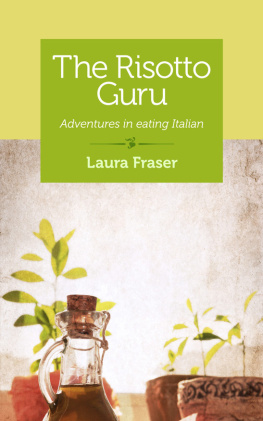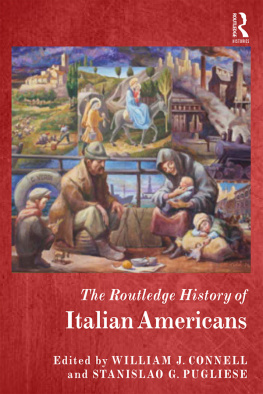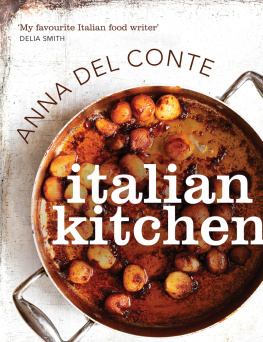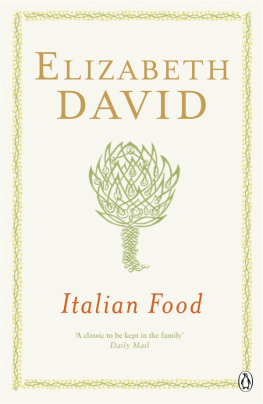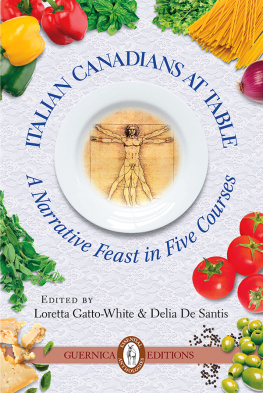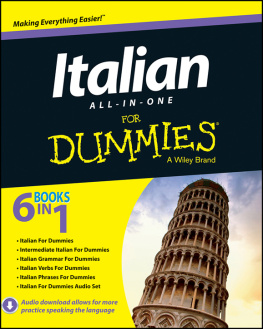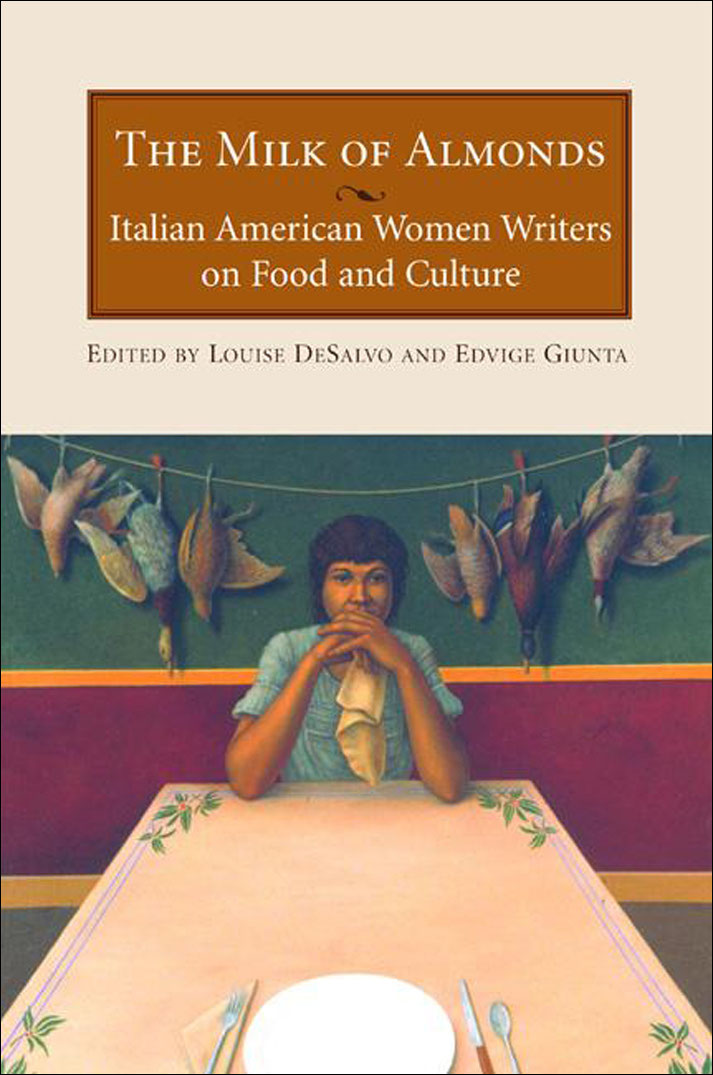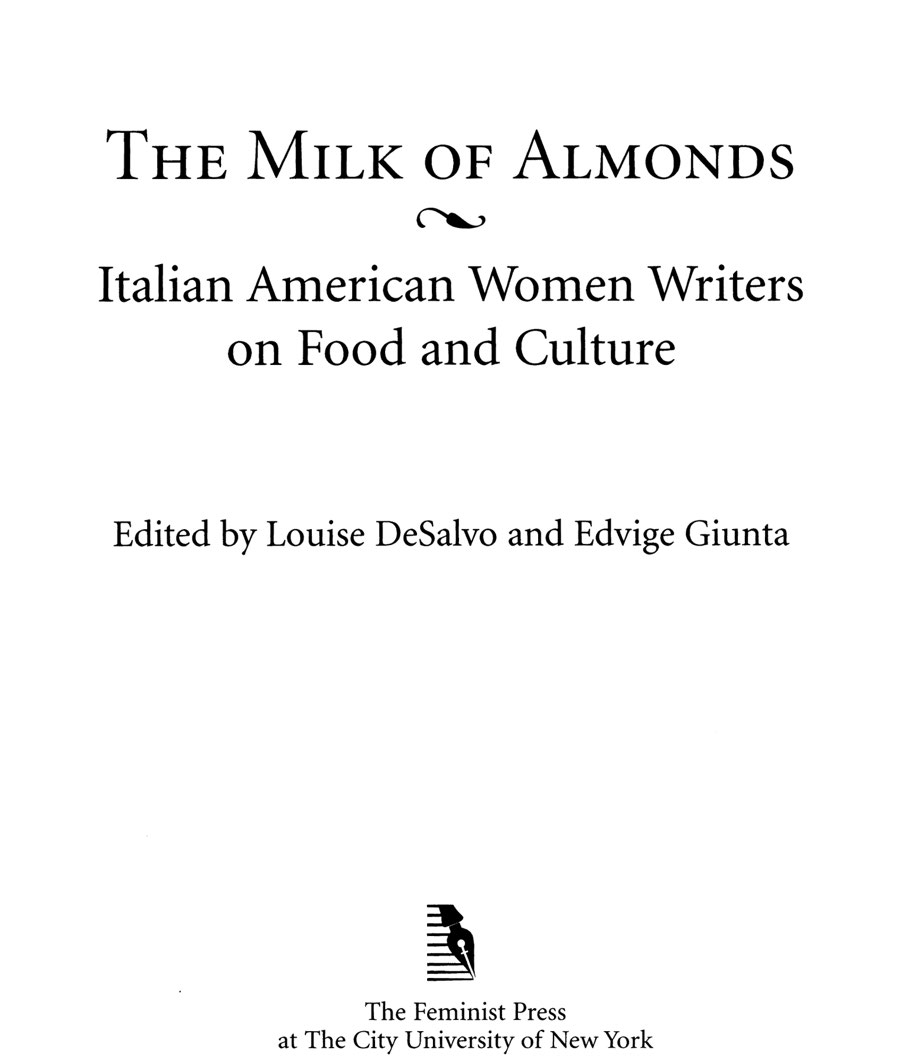Published by the Feminist Press at the City University of New York
The Graduate Center, 365 Fifth Avenue, Suite 5406, New York, NY 10016
feministpress.org
First edition, 2002
09 08 07 06 05 04 03 02 5 4 3 2 1
Selection, compilation, and introduction copyright 2002 by Louise DeSalvo and Edvige Giunta.
Copyright notices for the individual pieces in this volume can be found on pages 34346, which constitute a continuation of this copyright page.
All rights reserved.
No part of this book may be reproduced or used, stored in any information retrieval system or transmitted in any form or by any means, electronic, mechanical, photocopying, recording or otherwise, without prior written permission from the Feminist Press at the City University of New York, except in case of brief quotations embodied in critical articles and reviews.
Library of Congress Cataloging-in-Publication Data
The milk of almonds: Italian American women writers on food and culture / edited by Louise DeSalvo and Edvige Giunta. 1st ed.
p. cm.
ISBN 978-1-93693-210-8
1. American literatureItalian American authors. 2. Italian American womenLiterary collections. 3. Italian AmericansLiterary collections. 4. American literatureWomen authors. 5. GastronomyLiterary collections. 6. Italian AmericansCivilization. 7. FoodLiterary collections. 8. Gastronomy. 9. Food. I. DeSalvo, Louise A., 1942- II. Giunta, Edvige.
PS508.I73 M55 2002
810.80928708951dc21
2002005262
The Feminist Press would like to thank Mary Bisbee-Beek, Florence Howe, and Genevieve Vaughan for their generosity in supporting this book.
Text design and typesetting by Dayna Navaro.
Printed on acid-free paper by Transcontinental Printing.
To our mothers and grandmothers,
children and grandchildren
Annunziata (Mildred) Calabrese
Libera Calabrese
Assunta Calabrese
Cettina Minasola Giunta
Nunziatina Nuncibello Minasola
and
Deborah Jean
Emily Alice
Jason
Judith Lynn
Julia Frances May
Justin
Matteo Stuart
Steven Louis
CONTENTS
First, we would like to thank our contributors, who took our vision for this book, made it their own, and contributed poems, memoirs, and stories that far exceeded our expectations. This book is theirs as well as ours.
At the Feminist Press, we would like to thank Jean Casella, who responded enthusiastically to our idea for this volume, and who, throughout our work on the book, helped us refine our vision. Molly Vaux helped us turn the pieces we had gathered into a book, and assisted with the difficult tasks of editing and placement. Our many conversations with Jocelyn Burrell helped us see that we were on the right track. Heather McMasters enthusiasm and hard work in publicizing our volume is much appreciated.
We would like to thank our husbands, Joshua Fausty and Ernie DeSalvo, who gave us excellent advice as our project unfolded, and who assisted us in many ways, including a few photo sessions (with food).
We would like to thank Cettina Minasola Giunta, Giuseppina Impiduglia, Liliana Zuppardo, and Diego Giunta for helping us gather the material on almonds that we have drawn upon in our introduction.
Edvige Giunta would like to thank Larry G. Carter, Vice President for Academic Affairs at New Jersey City University and the Separately Budgeted Research Fund for granting her release time to work on this book. She also would like to thank Barbara Hildner, chair of the Department of English, her colleagues in the department, the Memoir Faculty and Staff Group and Jo Bruno at New Jersey City University for their support. Louise DeSalvo would like to thank Jennifer J. Raab, president of Hunter College, Richard Barickman, chair of the Department of English at Hunter College, and Harriet Luria, deputy chair, for their support.
We both would like to thank Peter Covino, Mary Ann Fusco, Jennifer Guglielmo, Kym Ragusa, Daniela Spampinato, and Francesco Di Vincenzo.
Finally, we would like to thank our families, and especially the people to whom we have dedicated this book. We have drawn upon the inspiration of their lives and their support of our work in the making of this book. And we hope, of course, that it will enrich their lives as it has enriched ours.
Louise DeSalvo and Edvige Giunta
Teaneck, New Jersey
March 2002
We have not standardized the spelling and syntax of Italian words in this collection. We chose instead to maintain the integrity of the language spoken by immigrants and/or to preserve the authors transcriptions of the Italian language they heard in their families and neighborhoods and, in some cases, could neither speak nor write.
... e la mandorla del dolore matura.
(... and the almond ripens with pain.)
ROBERTO ROVERSI
The Milk of Almonds was conceptualized about four years ago and gradually took shape when we talked on the telephone, as we always do, at the end of the work day, each of us making dinner in our own kitchens, one of us beating the ingredients for a frittata and the other stirring a risotto con i funghi made with ingredientsArborio rice, porcini mushrooms, saffronbrought back from a trip to Italy. We spoke of the exciting burgeoning of an Italian American womens literary tradition to which we both proudly belonged. We had shared much wonderful food. At Louises house, a beautiful veal, lightly floured, sauted in butter, and finished with white vermouth and salted capers, handpicked in Sicily, brought back to the United States by Mary Cappello, author of Night Bloom, and her partner, Jean Walton, and sent, as a gift, to Louise. And at Edis, a parade of pizzawith tomato sauce, or with anchovies, or capricciosa style, with sliced hard boiled eggs, ham, mushrooms, artichoke hearts, black olives, and mozzarellaand mpanata, a Sicilian focaccia, filled with sausage, spinach, potatoes, onions, and raisins, cooked for Christmas Eve and eaten with Daniela and Francesco, Edis friends from Sicily.
Yes, we had shared foodplanning meals, talking about where you could find the best produce and ingredients, exchanging recipes, cooking, and, of course, eating together. So, how could we not want to share a literary project about food?
Over the years, we had become avid and critical readers of each others works-in-progressmemoirs, essays, poems, and literary criticism. Gender and Italian American culture were at the center of our work, and it had become increasingly clear to both of us that one of the ways in which we could explore, understand, and write about constructions of gender in the cultural context of our shared ethnicity was to revisit the history of Italian American women in relationship to food, the history of our mothers and grandmothers: our history. Food, we had come to understand, played a particularly important part in defining modes of power within an Italian American domestic context (as it also does for those in other ethnic contexts, though perhaps differently).
The Milk of Almonds became the book that we had to do because of our respect and love for the literature that our Italian American sisters and we have been creating, and also because of our common love and respect for food, our recognition of its cultural power and of womens historical role as food-makers, and our sensory and sensual ties to the recipes from a country to which we are bothdifferentlytied: Louise, as a second-generation American, whose peasant maternal grandparents came from Bari, in Puglia, and whose working-class paternal grandparents came from Positano, in Campania; and Edi, a first-generation American who came to the United States in 1984 in her mid-twenties from Gela, Sicily, to study English and American literature.


